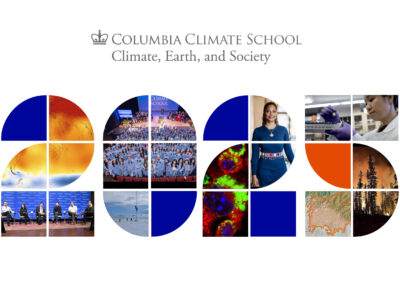
Kazakhstan, 2004. Image credit: Jacques Descloitres,
MODIS Rapid Response Team, NASA/GSFC
Is the worsening of hurricanes due to global warming? And how can we reduce the impact of natural disasters?
The answer to these and other questions came from the director of the Center for Hazards and Risk Research Art Lerner-Lam during a “live chat” sponsored by Emergency Information Infrastructure Partnership’s Virtual Forum on October 13, 2005.
Lerner-Lam was co-author of a recent report published by the World Bank in March that found over half of world’s population is exposed to one or more major natural hazards. read more about the Hotspots Report
Below is a sample of answers by Lerner-Lam from questions posed during the “live chat.”
Question: On the topic of storms, such as the worsening of hurricanes and such, is this partly due to global warming? And how can we prepare for this?
Art Lerner-Lam: That question is very important. There is scientific consensus on global warming. Two recent papers address the impact of warming on hurricane statistics. One, by Webster et al., discusses the impact of rising ocean temperatures on hurricane frequency, duration, and severity. It was published in Science just a few weeks ago. There is no statistical evidence that hurricane frequency and duration will be increased by global warming. However, the number of severe storms will increase; also, rising sea level will lead to more inundations.
Question: There is a strong relationship between the severity of a natural event in terms of its impact on people’s lives, and the extent of poverty in the affected area. Does your work take economic conditions in a locale as a given or do you work with groups trying to mitigate poverty, also?
Art Lerner-Lam: Good question. Poverty is an unquestionable factor in vulnerability. We are trying to link preparedness and mitigation to sustainable development agendas; in particular, we are linking disaster risk reduction to the attainment of UN Millennium Development Goals. This makes the link to poverty reduction explicit.
Question: You mentioned that the results of your analysis [in the Hotspots report] were not too surprising. But I am just wondering if there were any results that were a little surprising to you? Some additional insights that you might not have been expecting?
Art Lerner-Lam: Yes, there were some surprises. First, as a seismologist, I was surprised at how bad storms and floods really were. Second, drought in Africa dominates mortality. Third, coastal hazards and earthquakes affect the same populations. I should have guessed that one since coasts are there as a consequence of geology.
Question: Public information is such an important issue and most people get their information from the media. How do you suggest we use the media in a more useful role rather than the sensational?
Art Lerner-Lam: There are two parts to this: – First, professionals need to develop relationships with the media *before* things happen so that they understand the scientific, technical and social basics of disasters. Coordinate workshops with the media, and support programs in journalism schools. – Second, have prepared agreements with local outlets on the dissemination of crucial information. The sensationalism spikes. Studies by Reuters show a significant drop off once the humanitarian crisis is over. We need to keep contacts with the print journalists to keep the deeper, more important longer term aspects of reconstruction, rebuilding and planning. Those stories will be picked up by TV and radio. That’s our experience in NY.
Question: I’m not sure what you mean when you say “once the humanitarian crisis is over”? It seems that the humanitarian crisis drops from public attention in a relatively short time but lasts for much longer. Isn’t that the case with the South Asia tsunami, for example? How long will it take for the crisis to be over for the poor families that were displaced by that event?
Art Lerner-Lam: The media is interested in large- and small-scale stories of humanitarian crisis. Some of these are short term, such as death tolls. But these crises persist, as you suggest. I meant that the media focuses on relatively superficial measures of the crisis. The deeper problems are related to development and reconstruction. We have to continue to remind everyone of these stories. I think reports like Hotspots is one way to do this.



